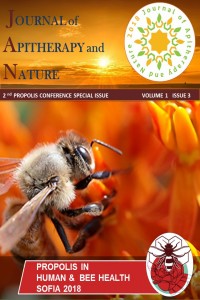Honey bees collect resins from plants and
use this material, called propolis, to line their nest cavity. Propolis is a
complex mixture of plant secondary metabolites (e.g., terpenes), beeswax, and
other compounds, and has been shown to inhibit the growth of pathogenic
microbes in vitro, as well as
reduce the severity of disease caused by bacterial and fungal honey bee
pathogens in the colony setting. Since honey bees from colonies that are
challenged by pathogens such as the fungus, Ascosphaera apis (chalkbrood), or the bacterium, Paenibacillus larvae (American
foulbrood), actively forage for resin, this behavior parallels those
displayed by other organisms that self-medicate in response to disease.
Unknown, however, is whether propolis has activity against the numerous
viruses that are both abundant and prevalent in honey bee colonies. Most
viruses known to cause disease in honey bees are (+)ssRNA viruses. These
viruses can persist at high titers without presenting overt symptoms until
the host is perturbed by some form of stress, such as pesticide or parasitic
mite exposure. Although some evidence suggests propolis has activity against
viruses that cause disease in humans, much remains unknown as to whether it
can inhibit dynamics of honey bee viruses. The research presented here is a
step towards determining whether propolis has activity against honey bee
viruses in vitro. Preliminary
results are from studies using an in
vitro model established from the honey bee embryonic cell line, AmE-711.
|
ASOS Index

